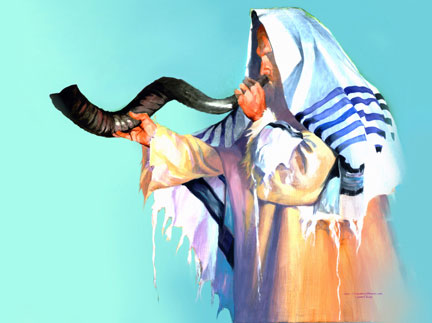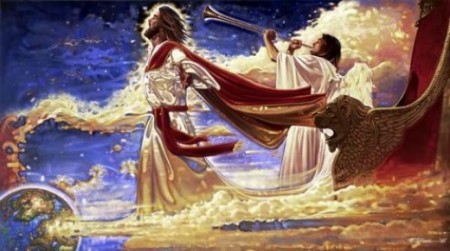In the month of July we looked at three of the seven Feast Days of Yahweh: Passover, Unleavened Bread and Pentecost. These three Feasts are often referred to as the "Spring Festivals", as they all occur during the Spring season. A "Summer break" (if one should so term it) is given between celebrations, and we resume in the Autumn season with the Feast of Trumpets!
Yom Teru'ah in Yisra'El
Leviticus 23:24 documented the command for the observance of the Feast of Trumpets, which was then known as Yom Teru'ah (day of blast). The children of Yisra'El were commanded to sanctify the first day of Tishri (seventh Jewish month) as a kodesh (holy) day for convocation, and a memorial for the blowing of trumpets. The trumpet was a very instrumental tool in the land of Yisra'El. It was the main instrument for mass communication (Num.10:2-4), warnings (Eze.33:3), celebrations (Ps.81:3) and special announcements (2 Kings 9:13). Having the various sounds of the trumpet so embedded in their lives; the children of Yisra'El understood the importance of recognizing and identifying the sounds of the trumpet. This is a skill that the apostle Paul alluded to in 1 Corinthians 14:8.
Jews today refer to this same Feast of Trumpets as Rosh Ha'Shanah which is literally translated "The head of the Year". It is believed in the Jewish community that it was during this time that the universe was created, hence the month of Tishri is marked as the beginning of the second New Year on the Jewish calendar. Seven days before Rosh Ha'Shanah Jews exercise what can be termed as a week of repentance. A special prayer of forgiveness called selichot is recited in the early mornings in the synagogues. This practice helps to set the atmosphere for what is to come on Rosh Ha'Shanah. On the first of Tishri (Rosh Ha'Shanah), the Jews week of repentance comes to an end, and a ten day period of prayer and self-examination begins, and then it all culminates on Yom Kippur (Day of Atonement).
Feast of Trumpets Today
For centuries the children of Israel celebrated the Feast of Trumpets as was commanded by Yahweh, but the true meaning of this amazing festival was not revealed until the writings of the apostles in the first century. Paul, in 1 Corinthians 15:52, made mention of the trumpet marking the first resurrection. This same idea was conveyed in Matthew 24:31. Not only does this trumpet sound call out to the saints who have died, but it also heralds the return of the Messiah (1Thess.4:15)! The Feast of Trumpets therefore, is a faithful celebration of the time when the Messiah shall return and call his people unto himself; first those who have died, and then those who are alive will be changed (1 Thessalonians 4:15-17).
A lot can be learnt from Yisra'El (Israel) in connection with the Feast of Trumpets. Just as the Israelites had to be on the alert and able to identify the sound of the trumpet to determine its cause, so must we as members of the body of the Messiah be on the alert and able to identify the signs and the seasons. In fact, a blast from a trumpet in Hebraic writings is often used in symbolic reference to waking someone suddenly from a slumber. The Feast of Trumpets therefore is set to raise awareness. It is set to move one from a sleeping state of ignorance to a wakened state of knowledge and consciousness. Paul alluded to this fact when he revealed the mystery of this feast in 1 Corinthians 15:51-52. Just as the Jews, at this time, exercise their aseret yemei teshuva (Ten Days of Repentance), so must our hearts be in wait and preparation for the arrival of our King, Yahshua the Messiah -this is the very embodiment of the Feast of Trumpets!
There are many theories regarding the return of the Messiah. Some believe He will come to earth to steal the Christians and take them back to heaven, others believe He will not come to earth fully, but will come half way the journey, then rapture the saints away. The Feast of Trumpets outlines in details what will happen at the return of the Messiah. Yahshua was questioned about his return in Matthew 24:3. His response did NOT convey a quick rapture or an easy escape for the saints as is being taught today, but rather, quite the opposite. Yahshua gave a list of things that MUST happen before, and in the midst of it all, he says "the end is not yet" (Mat.24:6-7). These things that Yahshua spoke about was seen by the apostle John and recorded in the book of Revelation. Each sign was marked by a trumpet (Rev.8:6-7). The apostle Paul showed in 1 Thessalonians 4:16 that the Messiah will descend from Heaven with a sound of a trumpet, and at that trumpet sound the saints who have died will be resurrected. These saints, along with those who are alive at that time, will be taken up into the SKY to meet the Messiah. This is not for them to be "raptured" into heaven, but rather, for them to escort the King into His Kingdom, which will be on earth (Rev.11:15). This is marked by the seventh and last trumpet!
The Feast of Trumpets therefore is a faithful celebration that heralds the return of the Messiah and King, the resurrection and transformation of the saints, and the establishment and reign of the never-ending Kingdom of Yahshua. It is not for us to know when all this shall come to past, but it is our duty to be prepared for what will come to past. Yahweh has equipped us with the knowledge and understanding that we need, so let us tarry faithfully as we do the Master's work and patiently await His return!
The Great Controversy
The Feast of Trumpets therefore is a faithful celebration that heralds the return of the Messiah and King, the resurrection and transformation of the saints, and the establishment and reign of the never-ending Kingdom of Yahshua. It is not for us to know when all this shall come to past, but it is our duty to be prepared for what will come to past. Yahweh has equipped us with the knowledge and understanding that we need, so let us tarry faithfully as we do the Master's work and patiently await His return!
The Voice of Yahweh has spoken ... He that has an ear to hear, let him hear what the Spirit says to the Churches



No comments:
Post a Comment